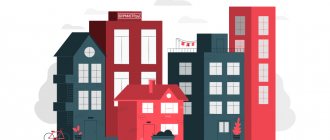What does AHR mean on a housing and communal services receipt?
In the receipt account there is such a line of expenses as AHR. AHR in the receipt is a fee for administrative and business expenses. According to the provisions of the Housing Code of the Russian Federation, it is stipulated that owners of residential premises in apartment buildings must pay monthly payments for utilities, which include:
- payment for maintenance, including fees for services, work carried out to manage an apartment building, pay for maintenance costs, current repairs of common property, as well as utility costs that are spent to ensure order in the house, the local area, lighting, heating, etc.;
- timely contribute funds for major repairs;
- pay for utilities according to tariffs or personal meters used by apartment residents.
The amount of payment for administrative and business expenses is adopted at a general meeting of the residents of the house, but if the owners cannot make a decision, the amount of monthly payments can be accepted by the management company.
Payment for administrative maintenance is a mandatory expense item that goes towards managing an apartment building. This money is used to pay for the work of responsible employees who organize house maintenance and maintain accounting records.
Where can I find out the housing and communal services payer code?
Author of the question: Markov K. Created: 12/08/21
Conclusion
- find the code
in the receipt in the upper right corner; - you can also find out the housing and communal services payer code
on the government services portal; - offline you can call the management company and find out
the information you are looking for there; - the code
is assigned by the management company; - in the event of a change in the Criminal Code, the CoP also changes;
Answered by: Rybakov N. 12/11/21
What does the abbreviation AUR mean on the receipt?
AUR in a payment order is payment for services provided by the management organization for the administrative maintenance of an apartment building. Everyone understands that people don’t work for nothing. The money that apartment owners contribute monthly goes to the salaries of the management, the building manager, accountants, office expenses, maintenance of the current account, payment of telephone bills, maintenance of the special premises occupied by the manager, furniture, provision of technical devices, etc.
The receipt may contain the designation AUR or AHR, this depends on the form of management of the apartment building. If both of these expense lines cost, it is illegal.
Heating
Who do we pay?
JSC "Teploenergo"
What are we paying for?
For the hot water that runs through pipes and radiators and warms us from September to May.
How much do we pay?
As in the case of hot water, heating fees are also charged at two tariffs. But, as Oleg Ilyasov
, here the fee is calculated differently - for each heated square meter. And the size of the social norm depends on the ratio of the area of the apartment and the number of residents.
“An area that is above the social norm is a slightly different tariff. 33 square meters is the social norm for one person. If there are two, then 42 squares. If there is an excess, then each square is charged at a rate “above the social norm”,
- said
Oleg Ilyasov
.
It should be taken into account that in the city of Kemerovo there are two types of houses: some have communal heat meters installed (this is approximately 90% of apartment buildings), while progress has not yet reached the rest. The former pay for heating only from September to May (0.28 Gcal/m2), the latter pay for the whole year (0.14 Gcal/m2). However, the calculation principle is the same in both cases.
Calculating payment for heating is the most complex mathematical operation in your “payment bill”. There are a lot of decimal fractions here, you have to multiply by zero integers and God knows how many thousandths, but if you decide to be a zealous owner, then please comply. However, in reality, everything is not so scary - the calculator will help you.
So, we are considering a payment for an apartment with an area of 70.8 m2, in which two people live. That is, in our case, 28.8 m2 must be paid at a more expensive, “supersocial” tariff. There is a common house meter, so the standard is 0.028 Gcal/m2.
The formula is as follows: number of Gcal/m2 x tariff x area.
0.028 Gcal/m2 x 595.14 rub. x 42 m2 = 710.84 rub. This is the price for 42 square meters according to the social tariff. Now we are carrying out the same operation for the remaining 28.8 m2 at a tariff above the social norm.
0.028 Gcal/m2 x 746.24 rub. x 28.8 m2 = 611.18 rubles (28.8 square meters at a rate above the social norm)
We add up the results:
710.84 + 611.18 = 1322.02 rubles – the total amount for heating the apartment in January.
By the way, there are no “common house needs” for heating. The calculations take into account the total cubic capacity of the house, which means that what you paid should be enough to heat the entrance, basement and attic.
Lines 5, 6, 7
What do administrative and management expenses include?
AUR are necessary costs that are associated with the management processes of apartment buildings. The cost items have already been listed above, but that’s not all. Administrative expenses go towards expenses that are used to maintain employees, pay utility bills, pay for travel allowances (if they are needed), cover legal costs (if, for example, the management company represents the interests of residents in court, for unauthorized charging of payment or failure to provide services specified in the contract).
The administration takes on a number of tasks that the owners cannot do themselves:
- select service personnel (janitors, cleaners, concierges, security);
- conclude agreements with resource supply organizations for the supply of water, gas, heat;
- ensure uninterrupted removal of solid household waste;
- find companies to carry out planned and major repairs of buildings and equipment;
- control the quality of services provided.
All this work is necessary to maintain the apartment building in excellent condition, to ensure the uninterrupted operation of systems and critical services.
Cold water and drainage
Who do we pay?
Water supply organization - JSC SKEK.
What are we paying for?
For cold water, without which there is no life, and for sewage, without which life is not life at all. Water intake, pumping stations, water treatment facilities, hundreds of kilometers of pipes - all this requires maintenance and repair. And there are hundreds of specialists who need to be paid salaries.
How much do we pay?
All difficulties ended with the “heating” item. Any second-grader with a calculator can handle the rest of the payment.
Water must not only be supplied to the house regularly, but also removed from it regularly. And this also costs money - 12.39 rubles per m3. The standard is indicated in the document, but only for informational purposes - so that people know how much precious moisture they transferred per month. Holders of our payment, for example, spent 14 m3. We multiply this amount by 12.39 and voila - your debt for sewerage is 173.46 rubles.
In the same way - by simple multiplication - we calculate the payment for cold water. The price of a cubic meter is 26.50 rubles, spent - 8 m3; multiply and get 212 rubles per month. For cold water, just like for hot water, a fee is still charged for “general household needs.” And also at a minimum - 5 rubles per month.
Lines 8, 9
How much do you need to pay for AHR, what happens if you don’t pay?
A management fee (AHR or AUR) is charged in the amount of 0.20 rubles per square meter of apartment, unless the meeting of HOA owners has established another fixed payment amount. Many are outraged that the HOA meeting made a decision and only presented the remaining owners with a fait accompli. The general meeting of residents and the HOA in this case, according to the law, are identical concepts, because the HOA consists of owners who own more than 50% of the housing in the apartment building. The right to set a tariff is approved by paragraph No. 2 of the Order of the Tariff Committee 31-r (07/09/2008).
In order to achieve a tariff increase, the management company (house manager) must present compelling arguments, provide estimates, invoice statements, and expense columns. If the owner does not agree with the decision, he has the right to appeal it in court.
Every citizen is obliged to pay utility bills in full every month. In case of failure to fulfill these obligations, the owner of the property may be punished in the form of penalties or fines. If a citizen does not pay for housing and communal services for a long time, the funds will be recovered through the court. In this case, you will not only have to pay the debt, a fine, but also legal costs.
Hot water
Who do we pay?
The energy supplier is Teploenergo OJSC.
What are we paying for?
For hot water in the bathrooms and kitchen, and also for “general household needs.” Funds paid by residents are used for the maintenance and repair of boilers and communications, the purchase of coal and fuels and lubricants, as well as for employee salaries.
How much do we pay?
In the second line, a system of two tariffs already begins to operate - “according to the social norm and above the social norm.” To pay for hot water, there is a uniform standard for the entire city - 3.37 m3 per person per month. In our “payment” we are talking about an apartment with two tenants. This means the standard is 6.74 m3. In December they used 6 m3 per couple. We met the standard, which means we count according to the social norm. We simply multiply the tariff by the cubic meters spent.
25.49 x 6 = 152.94 rubles
But let's make it more difficult. Let's imagine that the residents of this apartment took a bath very often and exceeded the norm, spending, for example, 8 m3 of hot water. In this case we think like this:
• 8 – 6.74 = 1.26 m3. This is excessive consumption of hot water.
• 6.74 x 25.49 rubles (social tariff) = 171.80 rubles
• 1.26 x 46.6 rubles (tariff “above the social norm”) = 58.71 rubles
• We add up the resulting results: 171.80 + 58.71 = 230.51 rubles. This is the amount you have to pay for hot water.
For general house needs, payment is fixed, according to the same standard. Our residents pay this 4.87 rubles every month.
“To be honest, this is a generally difficult position to explain. It is prescribed by law, but now the issue is being developed to make amendments and remove the ODN for water altogether. But until the amendments are made, we are accruing one fixed income tax – as stated in the law,”
— explained
Oleg Ilyasov
.
Line 4
Who distributes receipts for housing and communal services?
Paragraph 10 of Article 161 of the Housing Code of the Russian Federation states that the management company is obliged to provide consumers with full access to information about services, the procedure for their provision and implementation, costs, and tariffs. The contractor is also obliged to promptly provide receipts for payment of services in printed paper form. They are carried by inspectors or postal employees, putting them in mailboxes.
In addition, the receipt can be received electronically via Internet mail or in your personal account on the housing and communal services website.
Now many people use electronic payments. They have a number of advantages:
- the consumer receives a receipt immediately after it is generated;
- You can print the form at any time and in several copies;
- Payment can be made remotely.
You can also receive a receipt through the Unified Center if a single settlement center is servicing your home. To do this, you need to contact the nearest branch and write an application. You must specify your email address. You need to have the original with you, as well as a copy of your civil passport, documents that confirm ownership.
Energy supply
Who do we pay?
Electricity supplier – ESKK LLC.
What are we paying for?
For the joys of civilization - from the light bulb on the ceiling to the computer on which you are reading this article. Electricity supply means wires, substations, more wires, aerial platforms, more wires... in general, a huge enterprise and hundreds of workers.
How much do we pay?
Here, too, you don’t have to overload yourself with calculations. You may not even know what a kilowatt is. The main thing is to know the tariff. In Kemerovo there are two of them - 1.92 rubles for apartments with an electric stove, and 2.74 rubles for apartments with a gas stove.
Judging by our “payment” we can conclude that the stove in the house is electric and the owners spend electricity sparingly. The standard per person is 100 kilowatts per month. The residents spent exactly 200 - they met exactly the same amount. However, if you slightly exceed the norm, then it’s okay too - the price per kilowatt will not change in any case.
200 x 1.92 = 384 rubles – our monthly payment for electricity.
In the case of electricity supply, payment for common household needs is no longer a formality. Entrances, basement, attic, courtyard - all this needs to be illuminated, and most houses also have elevators. The payment for one-room service is calculated according to the common house meter. The balance that is not covered by apartment payments is the cost of single living expenses. This amount is divided by the number of apartments. In our case, it turns out - 40.506 kilowatts per month. We multiply by 1.92, we get a payment for ODN for electricity in the amount of 77.77 rubles.
Line 10
Electromagnetic locks
Who do we pay?
The intercom technical center - in our case it is TCD Digital-Kemerovo LLC.
What are we paying for?
For relative safety, cleanliness and order in the entrance. For complete peace of mind, one castle is still not enough - here you need to chip in for the concierge. For your money, the company is obliged to maintain the lock and, in general, the entire front door in good condition.
How much do we pay?
Depends on the agreement with the company. By the way, it won’t hurt to have a copy of this document on hand. “Tsifral”, for example, asks for 44 rubles per month. All. No calculations.
Line 11








